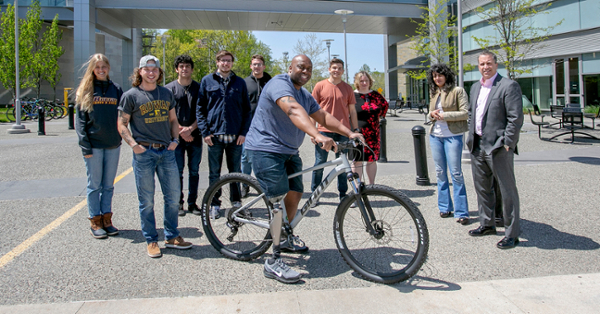Rowan engineering students help veteran amputee return to cycling
Rowan engineering students help veteran amputee return to cycling

For the first time since losing his right leg during a 2004 mission in Iraq, Army veteran Hilbert Caesar can ride a mountain bike outside, due to the work of six students led by the Department of Biomedical Engineering at the Henry M. Rowan College of Engineering and Quality of Life Plus, a national nonprofit serving injured veterans, first responders and others in service to the nation.
The organization matches STEM students in universities around the country with “challengers” like Caesar to create innovative technology solutions to improve their quality of life. Through physical rehab and assistance from the U.S. Department of Veterans Affairs, the York, Pennsylvania, resident can walk, drive and even pedal a stationary bike with his prosthetic leg. But he wanted to get outside and ride a bike with his family.
Dr. Jody Kakacek, program director for Quality Life Plus, persuaded Caesar to submit his application for the project and then connected the Rowan team with the veteran.
Last fall, the 44-year-old’s challenge—a bicycle adapted just for him—became a yearlong design project for six students led by Dr. Erik Brewer, senior lecturer and chair of Innovation and External Partnerships in the Department of Biomedical Engineering. It was the university’s third project with the nonprofit.
Representing biomedical, mechanical and entrepreneurial engineering majors, the students met virtually with Caesar in September and then began a series of extensive interviews with other active amputees, while also researching bicycles and modifications and the potential customer base for adapted bikes.
With funding provided by Quality of Life Plus, the students consulted with a nearby cycling shop, The Caffeinated Cyclist, before purchasing a high-quality, sturdy mountain bike and the parts they needed to tailor the bike to fit Caesar’s goals and comfort level. They later invited Caesar to their Glassboro, N.J., campus to test the bike while it was locked into a stand, recording his movements to calculate his range of motion.
To make the bike easier to mount and dismount, the students added a hydraulic dropper seat post that can raise or lower with the flick of a lever on the handlebars. To compensate for the decreased range of motion of Caesar’s prosthetic knee and the asymmetry between his prosthetic and unaffected limb, the team added a device to shorten the length of the bike’s right crank arm, the part that connects to a bike pedal.
“There are four different adjustable holes to put the pedal into,” all within the proper configuration for Caesar, explained Carley Tool, a graduating biomedical engineering senior. “It limits the range of the motion of the rider’s knee and puts less stress on the knee.”
To make the bike safer to use, the team chose reversible pedals that allow a rider to easily lock a modified bike shoe onto the pedal.
During their last class of their spring semester, the students presented Caesar with his new bike, along with the data and an explanation of their research to ensure the modified bike perfectly suits his needs.
“It works!” Caesar told the class, after pedaling for a few moments. “It looks good; it feels good.”
For Ben Afflitto, a graduating mechanical engineering senior, and Landyn Bacanskas, a biomedical engineering junior, Caesar’s reaction meant more to them than any other project so far.
“The final deliverable that we can hand to a person is much more meaningful than getting a degree,” Afflitto said.
“You’re actually using the tools you’ve learned over the past few years to engineer a product for someone,” added Bacanskas. “That’s very valuable.”
The Rowan team also included: Andronikos Nouragas, a biomedical engineering junior; Kenyon Burgess, an engineering entrepreneurship junior; and Anthony Boyko, a mechanical engineering senior.
“Fundamental to the engineering design process is taking the initial step to properly research the problem," said Brewer. "Quality of Life Plus does that by placing students in direct contact with their challenger and the greater disability field. Students spent their entire first semester improving their understanding of the challenges with Caesar’s unique disability and other sporting enthusiasts with limb differences. In the end, they came away with a not just a better understanding their design challenges, but also a greater appreciation of the abilities and motivations of the disabled community."
“These are exactly the types of projects we champion at Rowan Biomedical Engineering,” said Dr. Mark Byrne, founding department head and professor in the Department of Biomedical Engineering. “We find research and design projects with significant engineering challenges that can immediately be impactful to others.”